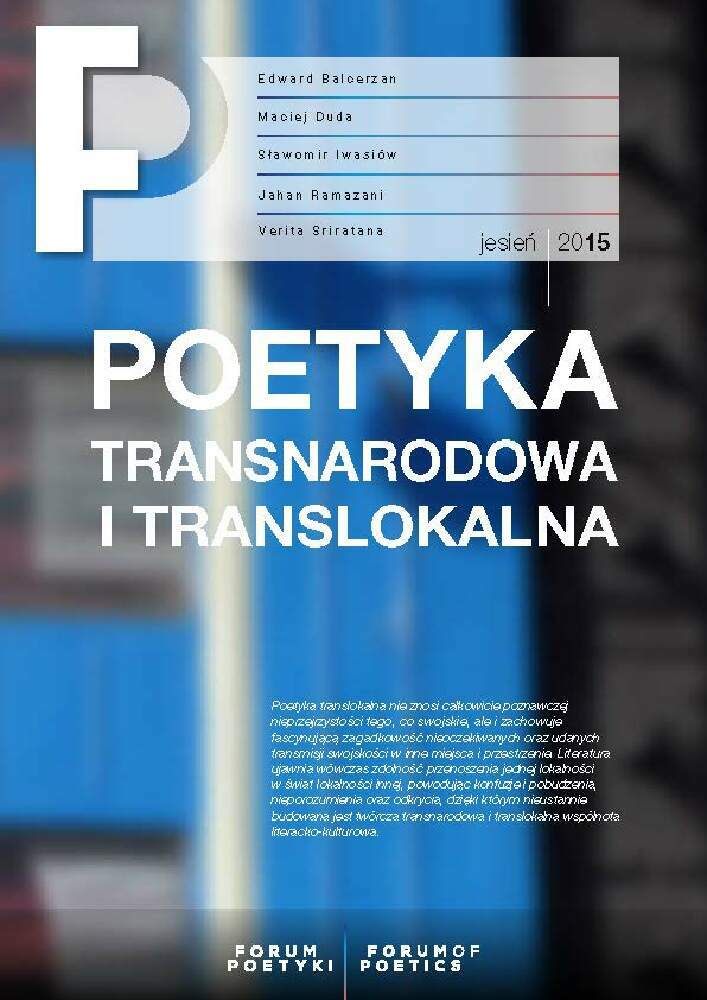Abstract
It is often understood that time can only be perceived in terms of space and that spatialisation of time limits the power of the abstract, or the virtual, by making it strictly dependent on material conditions. Modernist literature, it is often understood, appropriates this conceptual paradigm while hinting at a possibility that space can also be perceived in terms of time and that temporalisation of space deconstructs the façade of fixed and codified spatial meanings. Derrida defines this spatio-temporal (inter)reaction and logical co-signification as spacing (espacement). However, analysis of time and temporality, as well as analysis of space/place and spatiality, in modernist writing often falls into the pitfall of the problem of temporal succession and, subsequently, of the misconception that space is fixed. The problem of succession lies in the notion that time passes and ceases to be instant(ly), leaving only a Derridean “trace”, which is spatial. This notion is problematic as it is based on the implications that space is firmly fixed and passive despite temporal “spacing”, or succession, and that space is passively imprinted upon with traces of time. I argue that space is far from fixed and passive. Its dynamism renders spatialisation of time problematic. I propose that Franz Kafka’s “The Great Wall of China” (written in 1917) is a fine example of a modernist writing which not only problematises the concepts of time and temporality as well as of space and spatiality, but also puts on centre stage the problem of spatialisation of time. With its physical and ideological gaps and fragments as well as traces of illusory and unfinished signification, the “piecemeal” construction of the Great Wall of China in Kafka’s short story not only exposes the process of spatialising time, but also reflects the modernist subtle re-evaluation of such a conceptual paradigm.
References
Aristoteles. Fizyka. Przetłumaczone przez Kazimierz Leśniak. Warszawa: Państwowe Wydaw. Naukowe, 1968.
Ástráður Eysteinsson, i Vivian Liska, red. Modernism: Volume 1. T. 21. Amsterdam; Philadelphia: J. Benjamins Pub., 2007.
Bradbury, Malcolm, i James McFarlane. Modernism 1890-1930. Harmondsworth: Penguin Books, 1976.
Bridgwater, Patrick. Kafka, Gothic and Fairytale. Amsterdam: Rodopi, 2003.
Daintith, John, i Elizabeth Martin, red. A Dictionary of Science. Oxford: Oxford University Press, 2010.
Derrida, Jacques. Głos i fenomen: Wprowadzenie do problematyki znaku w fenomenologii Husserla. Przetłumaczone przez Bogdan Banasiak. Warszawa: Wydawnictwo KR, 1997.
Derrida, Jacques. Memoires for Paul Man. Przetłumaczone przez Paul De Man, Jonathan Culler, i Eduardo Cadava. New York: Columbia Univ. Pr., 1986.
Friedman, Susan Stanford. „Planetarity: Musing Modernist Studies”. Modernism/modernity 17, nr 3 (2010): 474.
Gray, Richard T. A Franz Kafka Encyclopedia. Westport, Connecticut: Greenwood Press, 2005.
Gray, Richard T. „Eine Kaiserliche Botschaft”. W A Franz Kafka Encyclopedia, 156. Westport, Connecticut: Greenwood Press, 2005.
Hägglund, Martin. Dying for Time: Proust, Woolf, Nabokov. Cambridge: Harvard Univ. Press, 2012.
Jian, Bozan. A Concise History of China. Honolulu: University Press of the Pacific, 2001.
Kafka, Franz. „Budowa chińskiego muru”. W Budowa chińskiego muru i inne nowele, przetłumaczone przez Alfred Kowalkowski i Roman Karst, 72. Gdańsk: Wydawnictwo Atext, 1996.
Kafka, Franz. Budowa chińskiego muru i inne nowele. Przetłumaczone przez Alfred Kowalkowski i Roman Karst. Gdańsk: Wydawnictwo Atext, 1996.
Kundera, Milan. Zasłona: esej w siedmiu częściach. Przetłumaczone przez Marek Bieńczyk. Warszawa: Wydawnictwo W.A.B, 2006.
Marx, Karl, i Friedrich Engels. Dzieła. T. 4. Warszawa: Książka i Wiedza, 1962.
Marx, Karl, i Friedrich Engels. „Manifest partii komunistycznej”. W Dzieła, T. 4. Warszawa: Książka i Wiedza, 1962.
Rosenthal, Sandra B. Time, Continuity, and Indeterminacy: A Pragmatic Engagement with Contemporary Perspectives. Albany: State University of New York Press, 2000.
Samuel Solomon. „L’espacement de La Lecture: Althusser, Derrida, and the Theory of Reading”. Décalages 1, nr 2 (2012): 20.
Shakespeare, William. Hamlet. Przetłumaczone przez Stanisław Barańczak. Kraków: Znak, 1997.
Wagenbach, Klaus. Kafka. Przetłumaczone przez Ewald Osers. London, 2003.
Wilke, Sabine, red. From Kafka to Sebald: Modernism and Narrative Form. London: Bloomsbury, 2012.
Woolf, Virginia. „Flying over London”. W The Captain’s Death Bed and Other Essays, 204. San Diego (Calif.); New York (N.Y.); London: Harcourt Brace Jovanovich, 1978.
Woolf, Virginia. The Captain’s Death Bed and Other Essays. San Diego (Calif.); New York (N.Y.); London: Harcourt Brace Jovanovich, 1978.
Wortham, Simon, red. The Derrida Dictionary. London: Continuum International Publishing Group Ltd, 2010.
Yang, Zhao. An Outline History of China. Beijing: Foreign Languages Press, 1982.
Yuan, Xingpei, red. The history of Chinese civilization. New York: Cambridge University Press, 2012
License
Authors of articles are responsible for securing the rights to other publications (texts, tables, drawings and other illustrations) quoted or reproduced in their texts.

